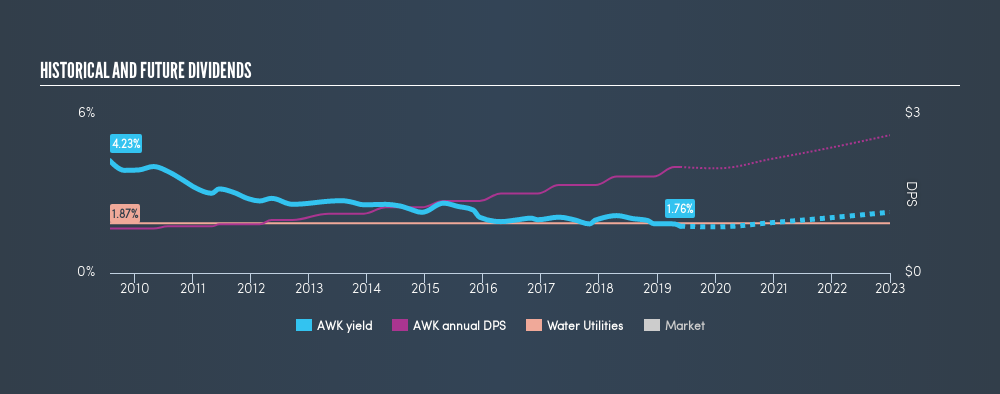- United States
- /
- Water Utilities
- /
- NYSE:AWK
Should You Buy American Water Works Company, Inc. (NYSE:AWK) For Its Dividend?

Could American Water Works Company, Inc. (NYSE:AWK) be an attractive dividend share to own for the long haul? Investors are often drawn to strong companies with the idea of reinvesting the dividends. Yet sometimes, investors buy a stock for its dividend and lose money because the share price falls by more than they earned in dividend payments.
A 1.8% yield is nothing to get excited about, but investors probably think the long payment history suggests American Water Works Company has some staying power. Some simple research can reduce the risk of buying American Water Works Company for its dividend - read on to learn more.
Click the interactive chart for our full dividend analysis

Want to participate in a short research study? Help shape the future of investing tools and you could win a $250 gift card!
Payout ratios
Dividends are usually paid out of company earnings. If a company is paying more than it earns, then the dividend might become unsustainable - hardly an ideal situation. As a result, we should always investigate whether a company can afford its dividend, measured as a percentage of a company's net income after tax. American Water Works Company paid out 57% of its profit as dividends, over the trailing twelve month period. This is a fairly normal payout ratio among most businesses. It allows a higher dividend to be paid to shareholders, but does limit the capital retained in the business - which could be good or bad.
In addition to comparing dividends against profits, we should inspect whether the company generated enough cash to pay its dividend. Unfortunately, while American Water Works Company pays a dividend, it also reported negative free cash flow last year. While there may be a good reason for this, it's not ideal from a dividend perspective. It's positive to see that American Water Works Company's dividend is covered by both profits and cash flow, since this is generally a sign that the dividend is sustainable, and a lower payout ratio usually suggests a greater margin of safety before the dividend gets cut.
Is American Water Works Company's Balance Sheet Risky?
As American Water Works Company has a meaningful amount of debt, we need to check its balance sheet to see if the company might have debt risks. A rough way to check this is with these two simple ratios: a) net debt divided by EBITDA (earnings before interest, tax, depreciation and amortisation), and b) net interest cover. Net debt to EBITDA is a measure of a company's total debt. Net interest cover measures the ability to meet interest payments on debt. Essentially we check that a) a company does not have too much debt, and b) that it can afford to pay the interest. With net debt of more than 5x EBITDA, American Water Works Company could be described as a highly leveraged company. While some companies can handle this level of leverage, we'd be concerned about the dividend sustainability if there was any risk of an earnings downturn.
We calculated its interest cover by measuring its earnings before interest and tax (EBIT), and dividing this by the company's net interest expense. With EBIT of 3.23 times its interest expense, American Water Works Company's interest cover is starting to look a bit thin. Low interest cover and high debt can create problems right when the investor least needs them. We're generally reluctant to rely on the dividend of companies with these traits.
Consider getting our latest analysis on American Water Works Company's financial position here.
Dividend Volatility
Before buying a stock for its income, we want to see if the dividends have been stable in the past, and if the company has a track record of maintaining its dividend. For the purpose of this article, we only scrutinise the last decade of American Water Works Company's dividend payments. The dividend has been stable over the past 10 years, which is great. We think this could suggest some resilience to the business and its dividends. During the past ten-year period, the first annual payment was US$0.84 in 2009, compared to US$2.00 last year. This works out to be a compound annual growth rate (CAGR) of approximately 9.1% a year over that time.
Dividend Growth Potential
While dividend payments have been relatively reliable, it would also be nice if earnings per share (EPS) were growing, as this is essential to maintaining the dividend's purchasing power over the long term. American Water Works Company has grown its earnings per share at 8.8% per annum over the past five years. The rate at which earnings have grown is quite decent, and by paying out more than half of its earnings as dividends, the company is striking a reasonable balance between reinvestment and returns to shareholders.
Conclusion
When we look at a dividend stock, we need to form a judgement on whether the dividend will grow, if the company is able to maintain it in a wide range of economic circumstances, and if the dividend payout is sustainable. American Water Works Company gets a pass on its dividend payout ratio, but it paid out virtually all of its cash flow as dividends. This may just be a one-off, but we'd keep an eye on this. That said, we were glad to see it growing earnings and paying a fairly consistent dividend. While we're not hugely bearish on it, overall we think there are potentially better dividend stocks than American Water Works Company out there.
Companies that are growing earnings tend to be the best dividend stocks over the long term. See what the 14 analysts we track are forecasting for American Water Works Company for free with public analyst estimates for the company.
We have also put together a list of global stocks with a market capitalisation above $1bn and yielding more 3%.
We aim to bring you long-term focused research analysis driven by fundamental data. Note that our analysis may not factor in the latest price-sensitive company announcements or qualitative material.
If you spot an error that warrants correction, please contact the editor at editorial-team@simplywallst.com. This article by Simply Wall St is general in nature. It does not constitute a recommendation to buy or sell any stock, and does not take account of your objectives, or your financial situation. Simply Wall St has no position in the stocks mentioned. Thank you for reading.
About NYSE:AWK
American Water Works Company
Through its subsidiaries, provides water and wastewater services in the United States.
Proven track record average dividend payer.
Similar Companies
Market Insights
Community Narratives



